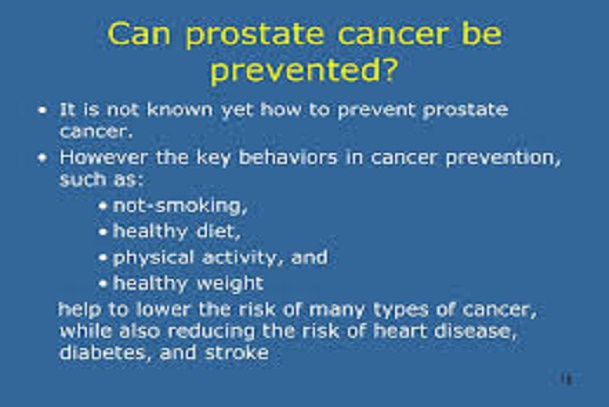 Wash your hands regularly and wear a face mask.
Learn more
Wash your hands regularly and wear a face mask.
Learn more

Generally, there is no sure way in preventing prostate cancer because many risk factors such as age, race, and family history can’t be controlled; though doctors recommend that men with an average risk of prostate cancer make choices that benefit their overall health if they're interested in prostate cancer prevention. Yet, there are some things one can do that might lower the risk of prostate cancer, and they include:
There are some particular lifestyles that an individual can either adopt or stop its addiction so as to reduce or increase the chance of prostate cancer. And they include:
It has been observed and recommended that having a healthy diet could help reduce the risk of having prostate cancer among men. The types of diet that can help prevent prostate cancer include:
Also, men who consume these fruits (i.e. watermelon, guava, pawpaw) and tomato - based products have a lower risk of prostate cancer than those who don’t.
It was suggested that cooking tomatoes makes it easier for your body to absorb lycopene. However, tomatoes need to be properly ripened (i.e. reddish) so as to absorb more lycopene. That means that pale, store-bought tomatoes that are picked too early have less lycopene than vine-ripened tomatoes.
By eating fruits and vegetables throughout the day, an individual is less likely to fill up on processed junk food.
Researchers have long studied the link between green tea and prostate cancer risk, with mixed results. A 2008 study showed that men who drink green tea, or take green tea extract supplements, have a lower risk of advanced prostate cancer than those who don’t.
Whether it’s from sex, masturbation, or wet dreams, men who ejaculate more appear to be less likely to get prostate cancer. Medical scientist haven’t been able to prove how it helps, but frequent ejaculation especially through sex can potentially help move irritating substances out of the prostate.
Once a man reaches the age of 40, it is imperative for him to understand that frequent screening for prostate cancer is important (especially for an individual who has a family history of cancer). The goal of screening for prostate cancer is to identify high-risk, localized prostate cancer that can be successfully treated, thereby preventing the morbidity and mortality associated with advanced or metastatic prostate cancer.
It is recommends that men talk to their doctor before having a test to check for prostate cancer. Men need to understand the risks and benefits of testing before proceeding with a PSA (prostate – specific antigen test (a blood test that can screen for prostate cancer) and digital rectal exam. For men aged 55 to 69 years, the decision to undergo periodic prostate-specific antigen (PSA)–based screening for prostate cancer should be an individual one.